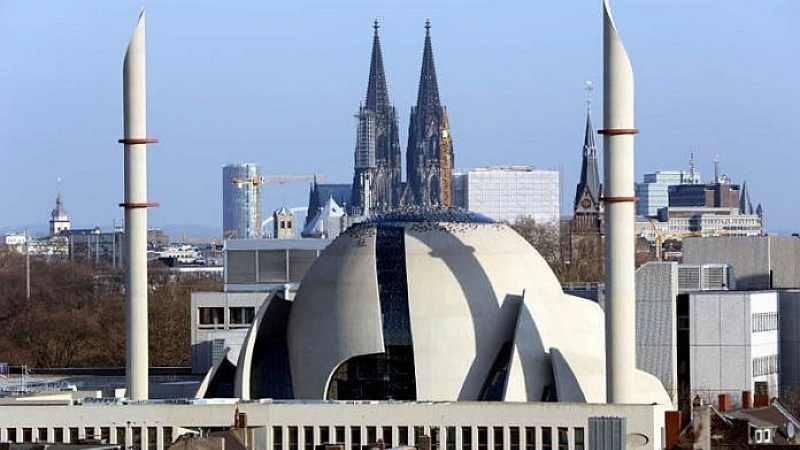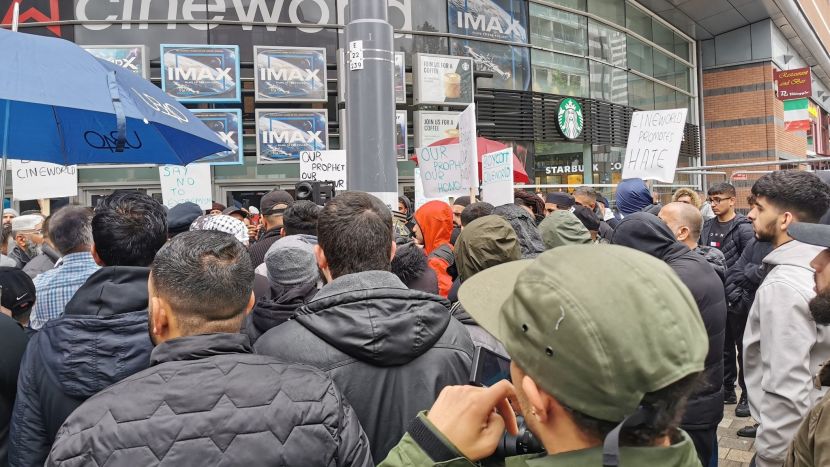October 14 marked the first muezzin call from the central mosque of the Turkish-Islamic Union for Religious Affairs (DITIB), which stands in Germany’s fourth largest city, Cologne. The city is home to approximately 120,000 Muslims, accounting for 11% of the city’s population. The DITIB mosque is one of 45. The event was met with mixed responses.
The call to prayer was made possible by Cologne’s non-partisan Mayor, Henriette Reker. Reker believes that the muezzin call cannot be denied to Muslims on the basis of the religious freedom principle enshrined in the German constitution. She stated that: “When we hear the call of the muezzin in our city in addition to the church bells, it shows that diversity is appreciated and lived in Cologne.” (Source) According to the permission granted by the city after two years of preparation and discussion (See previous Euro-Islam article), the call should not be louder than 60 decibels which means that it is audible through the loudspeakers as far as the pedestrian walkway of the mosque. The calls are limited to Friday prayer only for a maximum of five minutes between 1pm and 3pm.
Abdurrahman Atasoy, deputy chairman at the DITIB national association, said he was “very happy” about the agreement signed with the city of Cologne. “The public call to prayer is a sign that Muslims are at home…This is an important step in the perception of the Muslim faith community as part of society.” (Source) Zekeriya Altug – Chairman of the Board for DITIB’s Northern chapter – supplemented Atasoy’s point of view: “It is also a signal that Muslim life in Germany is becoming normal. We are not only Muslims, but we are also Muslims and the acceptance of this is very very important.” (Source)
A more neutral position was expressed by Detlef Pollack, a sociologist of religion from the University of Münster who declared: “The ringing of bells and the muezzin’s call have a similar function, but still the rejection for the latter is often stronger.” (Source) According to him: “Many are sympathetic to Christianity as a foundation of our culture – despite all criticism of the church. The ringing of the bells is perceived as part of that culture.” (Source) The muezzin however is perceived as something foreign that does not belong to Christian culture and in his view: “A considerable part of the population does not see Islam as an enrichment of our culture, but as something threatening”. (Source)
Taking a distinctly more critical position is Ahmad Mansour, a German-Arab Israeli psychologist (Source) who opposes the idea that both church bells and muezzin calls are an invitation to observance and prayer, stating: “I see it differently…The ringing of bells is about sound, the muezzin’s call is about concrete religious messages. The muezzin shouts that there is no God but Allah and that Muhammad is his messenger. So that’s clearly different from just ringing the bell”. (Source)
Mansour also challenges the idea that the rights of a religious minority are equal to those of the majority. He points out that if this degree of equality were to be granted, then Muslims could also demand state holidays, and much more. Mansour is concerned that an opening like permitting the muezzin calls to prayer, will empower religious conservatives who aspire to the Islamisation of Europe, by allowing them to demand further and further rights. Considering the muezzin call for prayer solely within the context of religious freedom is in his view “criminally naive.” (Source)
Furthermore, Mansour points out the link between the mosque and the DITIB, which is the extended arm of the Turkish religious authority in Ankara with President Recep Tayyip Erdogan personally opening the DITIB central mosque in Cologne, in 2017. He declared: “It is devastating that this organization, of all organizations, is now given such public recognition”. (Source) and to have the muezzin calls emanate from this mosque in particular “is a show of force of political Islam”. (Source)
Mansour also said that it may be easy to overlook that many young Muslims in Germany appreciate the fact that religion is not as visible in the German public sphere as it is in their families’ countries of origin: “They find it relaxing, they find it good. If they want to be on time for prayer, they just set their cell phones.” (Source)
Sources







